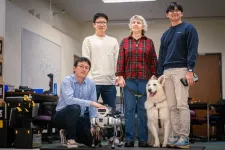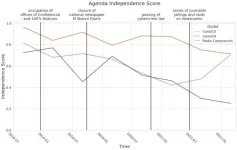(Press-News.org) Patients with very advanced solid tumors saw no significant improvement in overall survival after receiving systemic therapy, according to a study published today in JAMA Oncology by researchers at The University of Texas MD Anderson Cancer Center and Yale Cancer Center.
The findings provide further evidence to help oncologists counsel patients that additional cancer-directed therapy is not likely to benefit them, allowing them to focus instead on palliative and supportive care options that have been demonstrated to improve quality of life and survival.
“Our study highlights the importance of open and honest communication about prognosis between providers and patients,” said senior author Kerin Adelson, M.D., chief quality and value officer at MD Anderson. “Our findings may help oncologists reconsider treatment and instead provide patients with transparent information on supportive care options so they are able to make informed decisions.”
Adelson and colleagues analyzed de-identified data from more than 78,000 adult patients treated at 144 community oncology practices and academic/research centers. Patients included in the study were diagnosed between 2015 and 2019 with metastatic or advanced disease in one of the six common cancers: breast, colorectal, non-small cell lung, pancreatic, renal cell carcinoma, and urothelial cancers.
Researchers stratified oncology practices by how frequently providers gave systemic therapy for very advanced cancers and then studied overall survival of patients with six common solid tumor types treated in these practices. They found no difference in patient survival among practices that gave more systemic therapy for very advanced cancer compared with those who gave less.
“A large body of research has shown that goals-of-care conversations are critical to ensuring patients receive care in line with their prognosis and personal goals. This is even more critical when we know additional therapy will not improve a patient’s survival, but only cause toxicity and harm,” Adelson said.
As part of its institutional Strategy, MD Anderson is working to ensure goal-concordant care for its patients. This multidisciplinary approach integrates a patient’s individual values and goals into their care plans. MD Anderson is developing a number of strategies to encourage and streamline early conversations about goals of care, and the institution is identifying ways to restructure and realign resources related to palliative and end-of-life care.
Adelson began this research while at Yale Cancer Center. This study was supported by Flatiron Health. A full list of co-authors and disclosures is available here.
END
End-of-life systemic treatment for patients with advanced cancers does not improve survival
Study reinforces importance of providers focusing on supportive end-of-life care aligned with patient preferences
2024-05-16
ELSE PRESS RELEASES FROM THIS DATE:
To optimize guide-dog robots, first listen to the visually impaired
2024-05-16
May 16, 2024
To Optimize Guide-Dog Robots, First Listen to the Visually Impaired
Award-winning research led by UMass Amherst shows to be successful, Guide-dog users and trainers need to provide insight into features that make robotic helpers useful in the real world
AMHERST, Mass. — What features does a robotic guide dog need? Ask the blind, say the authors of an award-winning paper. Led by researchers at the University of Massachusetts Amherst, a study identifying how to develop robot guide dogs with insights from guide dog users and trainers won a Best Paper Award at ...
Imaging fibrous structure abnormalities of the white of the eye in myopathic patients
2024-05-16
Researchers provide an innovative approach to understanding ocular pathologies by visualizing the fiber structure of the sclera, the outermost eye layer
Tokyo, Japan – Eye diseases are extremely prevalent worldwide, with recent estimates suggesting that one-third of the global population suffers from some type of vision impairment. Given the high complexity of the human eye, the precise origin and nature of many eye diseases remain unclear, leaving affected people with limited diagnostic and treatment options.
Now, in a study made available online on March 7, 2024 and published in Volume 142, Number 4 of JAMA Ophthalmology on ...
Loneliness and mental health problems are interconnected
2024-05-16
“We have found a correlation between loneliness and several mental health problems,” says Associate Professor Rubén Rodríguez-Cano at the Norwegian University of Science and Technology (NTNU’s) Department of Psychology.
In a new study, researchers are looking at whether lonely people are more prone to problems such as depression and psychosis. Based on medication use, the correlation is clear.
“The risk of a lonely person also struggling with mental health problems is greater than for people who ...
Dr. Daniel Geynisman named new Editor-in-Chief for JNCCN—Journal of the National Comprehensive Cancer Network
2024-05-16
PLYMOUTH MEETING, PA [May 16, 2024] — Daniel M. Geynisman, MD, is being announced as the new Editor-in-Chief for JNCCN—Journal of the National Comprehensive Cancer Network. Dr. Geynisman has a long history of working with NCCN in a variety of roles and served as medical oncology section editor for Urologic Oncology: Seminars and Original Investigations since 2018 and authored more than 130 peer-reviewed publications. He is an Associate Professor in the Department of Hematology/Medical Oncology and Chief of the Division of Genitourinary Medical Oncology at Fox Chase Cancer Center.
“We are thrilled to welcome Dr. Geynisman into this ...
A new and better way to detect media censorship
2024-05-16
Worldwide news media are facing increasing pressure from autocrats to report favourably about their leaders and party politics. Political scientists launch a new computational method that can detect such media censorship by states while it is happening. This method provides valuable insights for communicating regime-driven media capture to the public. It is now described in detail in the scientific journal ‘Democratization’.
One of the first steps of would-be autocrats is to control the ...
Listening to muscles
2024-05-16
Spinal muscular atrophy or “SMA” for short is a terrible disease in which a genetic mutation causes certain nerves responsible for sending signals to muscles to degenerate. This leads to muscles wasting away, and many patients have died a painful death due to this rare condition. Genetic treatments have only been available for a few years. Now, a team led by Emmanuel Nedoschill, Ferdinand Knieling and Adrian Regensburger from the “Translational Pediatrics” working group at the Department of Pediatrics and Adolescent Medicine at Uniklinikum Erlangen have devised ...
Spider silk sound system #ASA186
2024-05-16
OTTAWA, Ontario, May 16, 2024 – The best microphone in the world might have an unexpected source: spider silk. Spiders weave webs to trap their insect snacks, but the sticky strands also help spiders hear. Unlike human eardrums and conventional microphones that detect sound pressure waves, spider silk responds to changes in the velocities of air particles as they are thrust about by a sound field. This sound velocity detection method remains largely underexplored compared to pressure sensing, but it holds great potential for high-sensitivity, long-distance sound detection.
Researchers ...
Equitable opportunity for transplants: Experts provide disparity-sensitive measures for transplant centers
2024-05-16
INDIANAPOLIS – An Expert Insight, published in the journal Transplantation, highlights health equity, disparity and inequality in organ transplantation along the continuum of care and across organ types. The authors provide a guide to transplant centers for the use of disparity-sensitive measures to monitor and address health disparities in transplantation and to redress long-standing inequities and inequalities in this vital arena.
“Our goal is to ensure that all patients who need a transplant have ...
Gene therapy relieves back pain, repairs damaged disc in mice
2024-05-16
COLUMBUS, Ohio – Disc-related back pain may one day meet its therapeutic match: gene therapy delivered by naturally derived nanocarriers that, a new study shows, repairs damaged discs in the spine and lowers pain symptoms in mice.
Scientists engineered nanocarriers using mouse connective-tissue cells called fibroblasts as a model of skin cells and loaded them with genetic material for a protein key to tissue development. The team injected a solution containing the carriers into damaged discs in mice at the same time the back injury ...
To sound like a hockey player, speak like a Canadian #ASA186
2024-05-16
OTTAWA, Ontario, May 16, 2024 – As a hockey player, Andrew Bray was familiar with the slang thrown around the “barn” (hockey arena). As a linguist, he wanted to understand how sport-specific jargon evolved and permeated across teams, regions, and countries. In pursuit of the sociolinguistic “biscuit” (puck), he faced an unexpected question.
“It was while conducting this initial study that I was asked a question that has since shaped the direction of my subsequent research,” said Bray. “‘Are you trying to figure out why the Americans sound like fake Canadians?’”
Canadian ...
LAST 30 PRESS RELEASES:
The Lancet: First-ever in-utero stem cell therapy for fetal spina bifida repair is safe, study finds
Nanoplastics can interact with Salmonella to affect food safety, study shows
Eric Moore, M.D., elected to Mayo Clinic Board of Trustees
NYU named “research powerhouse” in new analysis
New polymer materials may offer breakthrough solution for hard-to-remove PFAS in water
Biochar can either curb or boost greenhouse gas emissions depending on soil conditions, new study finds
Nanobiochar emerges as a next generation solution for cleaner water, healthier soils, and resilient ecosystems
Study finds more parents saying ‘No’ to vitamin K, putting babies’ brains at risk
Scientists develop new gut health measure that tracks disease
Rice gene discovery could cut fertiliser use while protecting yields
Jumping ‘DNA parasites’ linked to early stages of tumour formation
Ultra-sensitive CAR T cells provide potential strategy to treat solid tumors
Early Neanderthal-Human interbreeding was strongly sex biased
North American bird declines are widespread and accelerating in agricultural hotspots
Researchers recommend strategies for improved genetic privacy legislation
How birds achieve sweet success
More sensitive cell therapy may be a HIT against solid cancers
Scientists map how aging reshapes cells across the entire mammalian body
Hotspots of accelerated bird decline linked to agricultural activity
How ancient attraction shaped the human genome
NJIT faculty named Senior Members of the National Academy of Inventors
App aids substance use recovery in vulnerable populations
College students nationwide received lifesaving education on sudden cardiac death
Oak Ridge National Laboratory launches the Next-Generation Data Centers Institute
Improved short-term sea level change predictions with better AI training
UAlbany researchers develop new laser technique to test mRNA-based therapeutics
New water-treatment system removes nitrogen, phosphorus from farm tile drainage
Major Canadian study finds strong link between cannabis, anxiety and depression
New discovery of younger Ediacaran biota
Lymphovenous bypass: Potential surgical treatment for Alzheimer's disease?
[Press-News.org] End-of-life systemic treatment for patients with advanced cancers does not improve survivalStudy reinforces importance of providers focusing on supportive end-of-life care aligned with patient preferences






